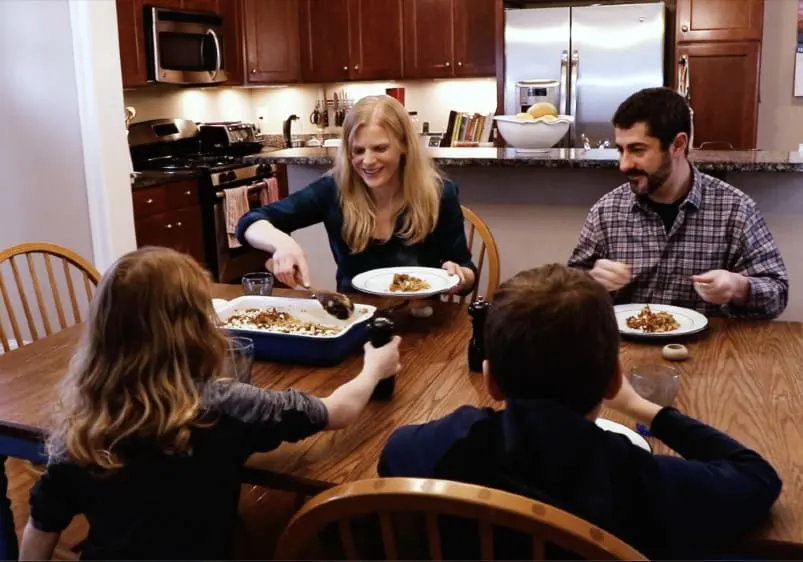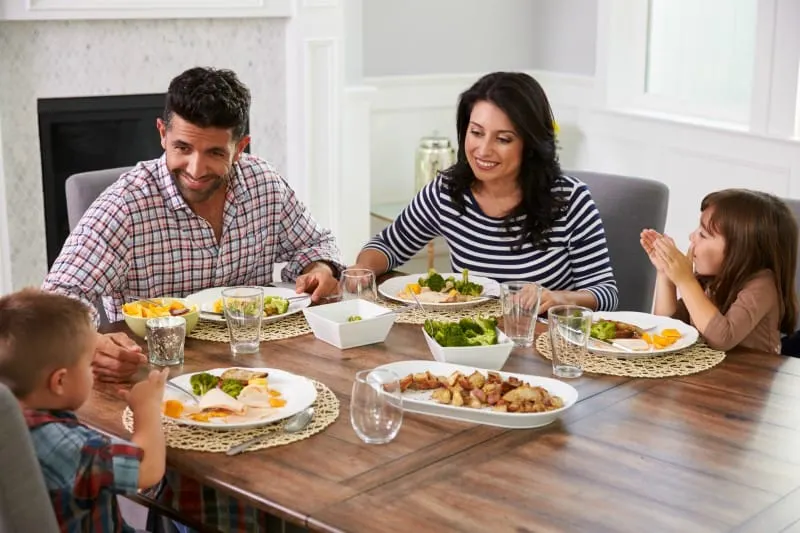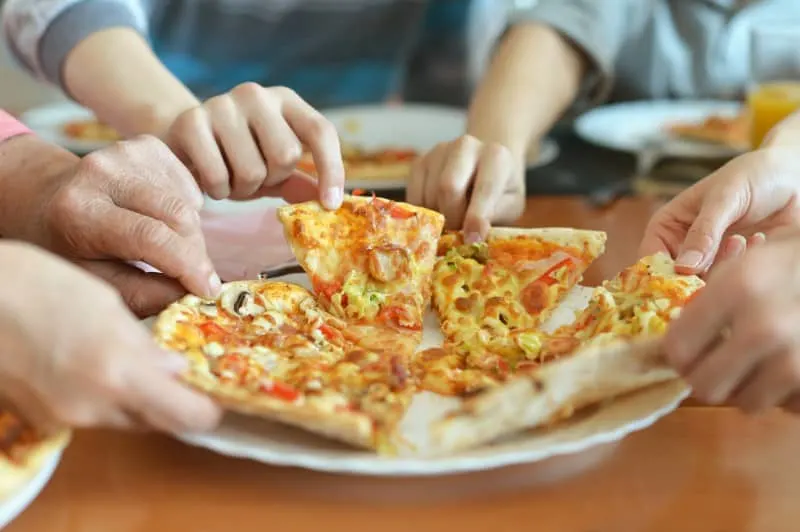“Hey Dad, want to hear how my day at school was?”
Those beautiful 11 words came out of my 13-year-old son’s mouth the other night at dinner. And I’m not gonna lie, when he spoke them, I teared up. Not because I was worried that he felt ignored or forgotten, but because it was proof that family dinners in our household are what I always hoped they would be: a place where we all feel comfortable and eager to share our lives with one another.

How to Get Kids to Talk at the Dinner Table
Looking back on the past 13 years of family dinners, I think that there were some major missteps and lessons that we had to learn, as well as some things we did well. So, I thought it would be helpful to share what we’ve learned about how to get kids to talk at dinner (and other times).
Make Family Dinner a Priority
One of the most important things you can do to create the environment in which your kids feel comfortable talking at the dinner table is to have family dinners on a consistent basis so that it becomes a time and place they are familiar with.
How Often Should My Family Have Dinner Together?
Different families will have meals together at different frequencies, for some it will be seven nights a week, while for others it will be less often. In our family, we usually have dinner together 5-6 nights a week, but it’s important to point out that we also sometimes eat dinner in front of a movie or even in different rooms.
There have been a number of studies done on just this question, so we can also look to the research. One study, for example, found that sharing a meal three times a week has many benefits and five times a week brings even more. But what is clear across the research is that consistently sharing meals increases connection and reduces the risk of potential issues such as drug and alcohol use and teen pregnancy.
So, I recommend setting a goal for a certain number of meals together each week and then trying to stick with it. If this is a new addition to your family’s schedule, then maybe start with three and see how it goes from there.
It Doesn’t Have to Be Dinner
It is important to note, that while the focus is traditionally on dinner, it doesn’t have to be that specific meal. The point is to share meals together. It could be breakfast, brunch on the weekend, or whatever meals fit into your family’s schedule.
It Doesn’t Have to Be Everyone
When my kids were little, they needed to have dinner by 6pm in order to get to bed on time. Unfortunately, though, my husband wasn’t able to get back from work until 6:30pm, at the earliest. So, we decided to do a modified family dinner schedule: I would start with the kids at 6:00 and he would join us as soon as he got home, even if it was for only 5 minutes. (If you or your spouse aren’t able to get home in time for dinner, make sure to check out my post on this exact situation.)
As the kids have gotten older and our obligations and schedules have changed, we have kept the same idea in place: there will be a family dinner every weeknight and those who are home will share dinner together. Now that the kids stay up later, we have pushed dinnertime back and can be more flexible on the start time as needed, but we also don’t consider it a failed family dinner if someone is missing from the table for a night or two.
The key takeaway being that the consistency of offering a shared meal every night is more important than everyone being at the table for every meal.

The Secret to Getting Kids to Talk: Keep It Light
While family dinners serve an important purpose, an opportunity to build stronger relationships with one another, they do not need to be, nor do I think they should be, serious affairs. In fact, I would argue that if you want the best possible outcome from your family dinners (i.e., your kids happily talking and sharing their days with you), you want to keep them light-hearted and fun. Here are some of the spots where families (including my own!) can get caught up in tension at the table.
Fighting Over Food
While as parents we, of course, want our kids to eat a well-balanced meal every single night, are anxious for them to try new foods, and would be overjoyed if they happily cleaned their plates every night, the reality is that for most of us this isn’t a realistic. Kids are going to pick at their peas, turn their noses up at the casserole, and fill up on the bread. And while this may drive us parents crazy, fighting with them about it isn’t going to serve anyone well.
I’ll be honest, when we first started doing family dinners, I constantly nagged my kids about their meals. “Aren’t you going to finish your broccoli?” “No more meat until you try your spinach.” And it took me a long time to realize that I wasn’t winning them over to the foods, in fact, all I was doing was adding tension to the table and shutting down other conversations we could be having.
When I decided to shift my approach in how I offered foods and stopped trying to manage their meals, family dinners became much happier and more relaxed affairs.
So, I would encourage you to try your best to take the tension around food off the table and instead focus on the emotional connections you are trying to build at family meals.
The healthy eating habits you want to promote? A better bet is for you to model the kind of eating you hope to see from them and, in time, they will follow your lead.
For more on these particular struggles, check out my posts on what to do when your kid refuses dinner and my interview with my formerly picky eater.
Manners
I am a firm believer in good table manners. I have worked hard to teach my kids how to set a table, how to politely ask for an item to be passed to them, how to be mindful of how much food is available so everyone has their fair share, and how to properly use their utensils. I also believe that family dinners are a great place to learn and practice those table manners.
But I also know from experience that harping on those manners can quickly backfire and turn your mealtime into misery, especially for your kids. So, the approach that our family has taken is to teach the manner in question a few times and then offer gentle reminders consistently. Here’s what that looks like with a real-life example in our house:
I’ve got one kid who is a LOUD eater (which is one of my pet peeves). There are times when the smacking gets so irritating that I want to reach over and force him to close his mouth as he chews. But after a number of instances of me snapping at him about it, his getting defensive, and tensions building, I realized that it worked better if we had a code word that I could use as a reminder without turning it into a big thing. So now, when he chews with his mouth open, I just say the word, “mouth.” He knows that’s a queue to watch his manners and will catch himself. It’s still a work in progress, but it has definitely gotten better.
Family Meetings
One of the best family dinner rules my parents had that I have adopted for my own family is the following: family problems and/or major decisions should be handled at Family Council Meetings, not at family dinners.
This helps to keep family dinners from becoming business meetings and/or sources of tension and instead protects them as a respite from the stressors of life, therefore encouraging your kids to feel more comfortable talking about their days.
That doesn’t mean, however that you shouldn’t talk about serious topics or share hard things that happened to you during a day. In fact, family dinners are a place to encourage such sharing so that we can support one another.
Similarly, it is important to note that, of course, there will be times when spats occur during family dinner. That is a completely natural part of family dynamics and those tensions should be resolved rather than ignored or silenced.
The idea here is that if there is a need for a larger conversation that would not otherwise naturally come up, it is a good idea to schedule a specific time, a Family Council Meeting, to bring that issue to the family so that family dinners can stay the positive piece of family life you are trying to allow them to be.

How to Get Kids to Share More About Their Days
We all know how hard it can be to get our kids to share anything more about their day than that it was, “ok/good/fine.” So how do we get kids to talk more? I believe that the answer lies in a combination of good questions, consistency, and modeling.
More than “How was your day?”
In our family we almost always start with the most obvious first question, “how was your day?” (The one exception is if there was something big that day that we know was going to happen that we want to ask about such as a big test or presentation, a friend issue, or some other special event.)
But if the go-to “how was your day?” fails to illicit much of a response, we are always ready with follow up questions to encourage sharing. Some of our favorites include:
- What was something kind that someone did for you today?
- What was something kind that you did for someone else today?
- What was something that made you laugh today?
- What was one thing you learned today?
- What was the hardest thing that happened today?
Sometimes you won’t get them to talk, and that is ok. The point here is to make sure that you provide the opportunities to share.
Everyone is Included
Another important piece is to make sure that everyone at the table is asked about their day – kids and adults. This is so that everyone feels included, but also so that your kids not only have an opportunity to share, but also learn how to listen and engage in back-and-forth conversation. Skills that will serve them well throughout life.
Model Conversational Skills
Just like we parents should model the kind of healthy, balanced eating we’d like to see our kids do, we should also do our best to model the conversational skills we hope our kids to develop. This includes sharing openly and cheerfully about our days, listening attentively to others when they share about theirs, and asking follow up questions to learn more.
As humans we learn so much by observing and doing and what better place to learn the skills of conversation than in the comfort and safety of our own homes.
Try Not to Rush
I truly believe that one of the reasons family dinners have been such a success for my family is that we don’t rush them. Yes, our lives are crazy busy and we often feel like we are sprinting from one thing to the next, but by refusing to speed through family dinners we have allowed them to become a respite from the seemingly constant rush.

Make it Fun
Finally, and most importantly, dinner should be fun. Yes, I’ve just given you a looooong list of things to think about and possibly change in the way you approach family dinners, but in the end the point is for these times together to be a positive experience and what is more positive than fun?!
So, play games, have light-hearted conversations, and laugh. If you want inspiration on how to make family dinners fun, check out my post on family dinner games for a ton of ideas!
Family Dinners Won’t Always Be Perfect
Just in case you think that family dinners in my house are all sunshine and roses, I want to be completely clear: we’ve had some major mess-ups over the years. We’ve had fights over school work, meltdowns over food (usually me), and people storming away from the table, and even tears.
But I think that’s kind of the point: family life isn’t always pretty or perfect, but we still show up for one another and that’s what we want family dinners to be like, too. They won’t all be smooth and happy, but we still keep coming back because in the end we enjoy each other’s company and love one another.
So, when a family dinner goes off the rails or if you have a phase when they’re rough, don’t lose faith, trust that if you keep it up the rest will fall into place.
